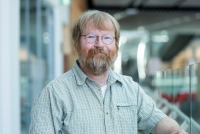 NOTÍCIES
NOTÍCIES
Thomas Surrey, new fellow of the American Society of Cell Biology
Thomas Surrey, CRG's Senior Group Leader.
The American Society for Cell Biology (ASCB) has recently presented Thomas Surrey within its cohort of 14 new Fellows for 2021.
“It's a great honour to be elected ASCB fellow. From early on in my career, attending the ASCB meeting has always been a source of inspiration and a great opportunity to meet colleagues from all over the world to discuss science”, says Thomas Surrey, ICREA Research Professor and Senior Group Leader at the Centre for Genomic Regulation (CRG), in Barcelona.
“ASCB Fellows represent not only top-performing scientists who have contributed significantly to cell biology and to the community of scientists studying the cell, but also individuals who have demonstrated throughout their careers their commitment to ASCB’s mission,” said Kevin Wilson, Interim Co-CEO of ASCB.
Election as a Fellow of ASCB is an honour bestowed upon ASCB members by their peers. The list of approved Fellow nominees is reviewed and approved by the ASCB Council. The new cohort of ASCB Fellows will be formally recognized before the keynote at the 2021 Cell Bio Virtual meeting online in December.
- Suresh Alahari, Louisiana State University
- Derek Applewhite, Reed College
- Daniel Colón-Ramos, Yale University
- Pierre Coulombe, University of Michigan
- Jennifer DeLuca, Colorado State University
- Andrew Ewald, Johns Hopkins University
- Primal de Lanerolle, University of Illinois at Chicago
- Ruth Lehmann, Whitehead Institute, MIT
- Lee Ligon, Rensselaer Polytechnic Institute
- Berl Oakley, University of Kansas
- Carole Parent, University of Michigan
- Thomas Surrey, Centre for Genomic Regulation
- Yukiko Yamashita, Whitehead Institute, MIT
- Alpha Yap, University of Queensland
About Thomas Surrey
Thomas Surrey obtained his PhD in Biochemistry at the University of Tübingen in Germany. After a three-year period as postdoctoral fellow at Princeton University, USA, he moved to EMBL Heidelberg, in Germany, first as postdoctoral fellow/staff scientist, and subsequently as team/group leader. In 2011, he moved to London and took up a position as a senior group leader first at the London Research Institute, Cancer Research UK, and after six-years at the newly-created Francis Crick Institute, also in London, UK. In October 2019, Thomas joined the CRG’s Cell and Developmental Biology Programme as ICREA Research Professor and senior group leader.
The Surrey lab studies how the internal structure of cells self-organizes, and seeks to understand how the different parts of the cytoskeleton, the cell’s internal scaffold, work together to form distinct architectures and how they change as the cell divides or differentiates. The ultimate goal is to ascertain how complex biological structures can be created from simple, smaller parts. In many of his group’s experiments, the researchers construct a mini version of the cytoskeleton from a limited set of purified components. Using fluorescence microscopy, quantitative analysis and modelling, they can elucidate how the components of the mini-cytoskeleton come together and organize themselves into different structures. They want to understand how self-organizing scaffolds change in response to changing conditions inside the cell. These changing conditions may be caused by normal cell cycle activity changes, by signals stimulating differentiation or by disease-inducing factors.
By combining biology, physics and chemistry approaches, they set out to discover the design principles underlying intracellular order and mechanics, revealing new information about the fundamental physical properties of living cells.

